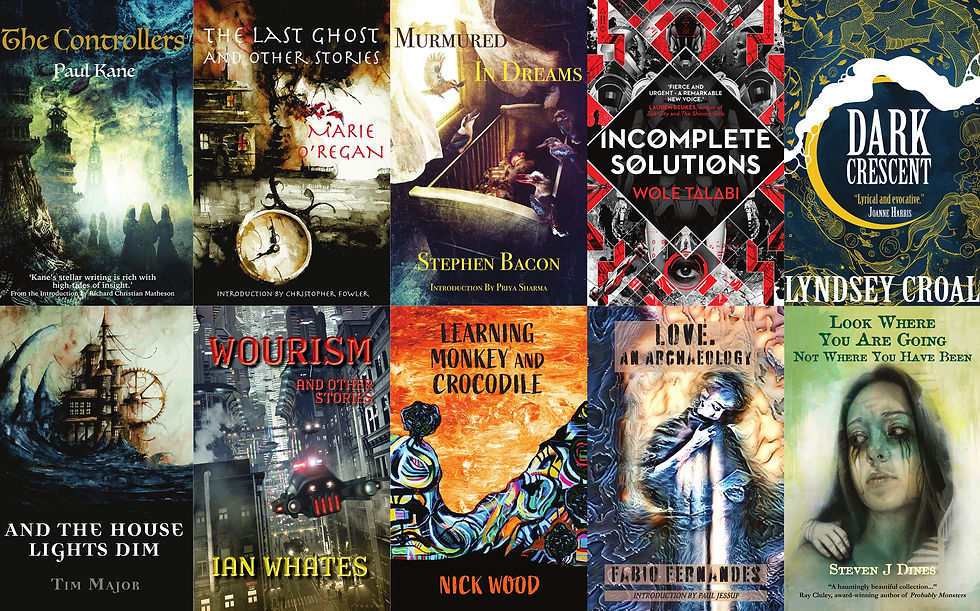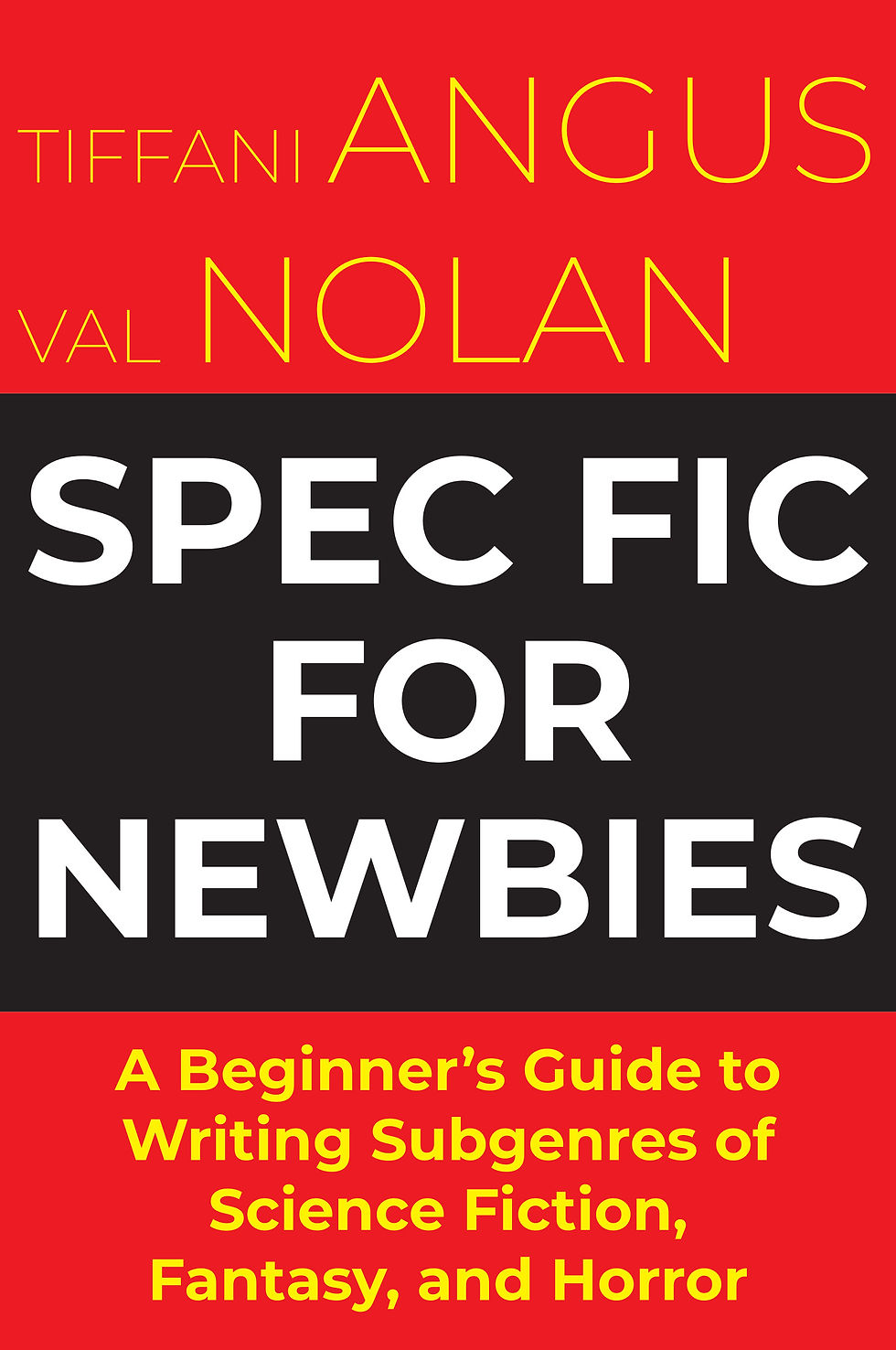
BOOK AND COVER ART NOMINATED FOR THE BSFA AWARDS 2017.
This is an essential guide to help readers and writers of fantasy know their grimdark from their urban, dark, epic, high and metaphysical fantasy. International fantasy author A J Dalton explains how each of the sub-genres of fantasy literature is a response to their own social and historical period. Each sub-genre thereby describes a distinct political and philosophical outlook. Fantasy is far more important than many people truly understand!
The Sub-Genres of British Fantasy Literature
“Thoughtful, insightful, while sure to prompt debate, and that can only benefit all facets of the fantasy genre.” Juliet E. McKenna (Fantasy Author)
Written by A J Dalton.
Cover art and design by Jay Johnstone.
Paperback edition.68 Pages
Publication date 14/02/2017
ISBN: 9781911143161e-Book ISBN: 9781911143178
5 ✩ "Fascinating insight into the various genres of British Fantast Literature. Thoroughly enjoyable and so easy to read. It might be non fiction but Adam still holds you attention throughout the whole book." scfc4ever on Amazon.co.uk
4 ✩ "OK, disclaimer: I've spoken to the author online, maybe twice or three times. Otherwise, I wouldn't know him if I found him floating in my tea. I'm not connected to him, his family, his friends, his pet(s) [if any] or his publisher. I bought this with my own cash, of my own free will, without threats or inducements of any kind.This little volume, which is only 47 pages long, was - I believe - part of the author's submission for a Ph.D. in Creative Writing (the other part being publication of a novel, I believe).Dalton matches up the development of fantasy from the 19th century onwards with sociopolitical events at the time of their publication; the human-centric optimism of the Victorian age (Jules Verne, H.G. Wells), to the grimdark of the austerity-driven 2010s. I don't agree with him on everything - shockingly, I side with my mother-in-law on the interpretation of Lord of the Rings - but he makes some good points. For a mere 47 pages, this is an interesting read, although it won't contain many surprises for a reader who has paid attention to the trends in fantasy writing.I did find myself wishing that it was longer: I'd like to have had more detail, more examples, and maybe connections to non-fantasy literature. On the other hand, in 47 pages, the author gives the reader enough of a starter that the reader can go off and start doing their own thinking..." TK Elliot on Amazon.com
4 ✩ "A great journey through the history of british fantasy, linking the biggest selling books/plots to political and social events of the time, which makes us understand the background of many of the great books. Even better, this isn't done in a boring, lecturing way, but keeping us interested and engaged." ScarletBea on Amazon.co.uk
"It is always interesting to read good non-fiction books about SFF&H, and when it happens to be an informed reflection on a genre as complex as fantasy, it’s definitively a treat. This is the case of latest AJ Dalton’s non-fiction work The Sub-Genres of British Fantasy Literature recently published by Luna Press. The underlying philosophy here is that, as much as each period is distinct in terms of culture and history, its respective literature is likely to bear, and reflect, certain distinct features. Fantasy is no exception.
Dalton knows what he’s talking about, being the author of many internationally acclaimed fantasy novels. After having set the stage, he proceeds to analyse the different typologies of fantasies, in particular ‘grimdark fantasy’ and ‘metaphysical’ fantasy, which, more than the previous kind, better reflect our troubled times.
No matter what your own tastes (and opinions) are, however, The Sub-Genres of British Fantasy Literature is a well-written, engaging and compelling book that I recommend to all speculative fiction readers. I look forward to something in kind for different genres."
http://earthianhivemind.net
5 ✩ "I normally avoid non-fiction. The style of those books is normally dry, as if I have intended a droning lecture.However Dalton's writing has always kept me interested, so I picked it up.What I got was a journey showing the roots for the different genres of fiction. How the times actually shaped the ideals and themes.Dalton gives examples of the stories from each decade to show the way the stories shift and change to outer influences.I wasn't disappointed and I admit I never thought about the era a fantasy novel came from."
By Aitwo on Amazon.co.uk
5 ✩ "What a great insight into fantasy literature. A shame this book wasn't available a few years ago when I first began reading fantasy."
By Louisa Dunn on Amazon.co.uk
5 ✩ I really enjoyed this book. If you think that non-fiction is boring, think again. Dalton takes you through the sub-genres in a very accessible way. As he relates them to the decades in which they were created, you can see the link very easily. It's about 10K words, so not too heavy, but very useful for researchers and readers alike. By Trixter76 on Amazon.co.uk
5* "This book is like a college survey course (101) and covers the development and defining features of fantasy sub-genres over the last century . . . only it's much more enjoyable to sit in your study or a coffee house than to wedge into tight wooden-seat desks in a drafty classroom. It is quick--only 50 pages with a solid bibliography. Mr. Dalton resists the opportunity to present a stolid bit of literary history in favor of a lucid description of what, from this author's perspective, is important about the genre. In particular, he links concurrent sociopolitical factors with the sequential development of sub-genres. An interesting and largely convincing approach. I wouldn't be concerned about Mr. Dalton's analysis being too provincial. Though most of the references are to British authors, it is not difficult to see the sociopolitical and literary parallels in U.S. fantasy novels." By Chris O'Neil on Goodreads
4* "Adam (AJ) Dalton's slender exegesis is part of his PhD work, serving to help position his own fiction at the forefront of the subgenre of metaphysical fantasy that he coined back in 2008. That subgenre, Dalton claims, is a darker evolution and extension of traditional epic fantasy, reflecting the cynicism and anxieties of the modern world yet still maintaining many of the traditional tropes and never turning as nihilistic as Grimdark. While the heroes and Chosen Ones of metaphysical fantasy may go on quests to save the world, and to discover themselves, they may break both in the process. Unlike traditional epic fantasies, there may not be happy endings, but unlike Grimdark, there is always hope.The evidence Dalton gathers to support this argument relies on examination of his own books (notably Necromancer's Gambit and Empire of the Saviours) and contrasts against other leading fantasy literature, as well as the social and historical context of previous subgenres of fantasy. I can't help feeling that a greater examination of the development and differences between metaphysical fantasy and Grimdark might have been beneficial, given Grimdark's continued dominance in the field - though as it stands I firmly support Dalton's assertion that metaphysical fantasy ploughs a more hopeful and optimistic field, since despite the bleakness of the times we still need heroes, even if they are broken ones.I'm also slightly surprised that Dalton doesn't focus more on the work of Michael Moorcock, whose conflicted Eternal Champion surely has to be the Golden Age progenitor of metaphysical fantasy, but that is probably an argument for somebody far more scholarly than myself. In effect Dalton has laid the groundwork for a robust discussion of the history and context of British fantasy literature, that I can happily recommend both to fans of the fantastic and to folk who have less familiarity with the genre" By Steven Poore on Goodreads
A J Dalton (the ‘A’ is for Adam) has been an English language teacher as far afield as Egypt, the Czech Republic, Thailand, Slovakia, Poland and Manchester University. He has lived in Manchester since 2003, but has a conspicuous Cockney accent, as he was born in Croydon on a dark night, when strange stars were seen in the sky.
He is the best-selling fantasy author of I Am a Small God (2017), The Book of Angels (2016), The Book of Orm (2015), Empire of the Saviours (2012), Gateway of the Saviours (2013), Tithe of the Saviours (2014), Necromancer’s Gambit (2008), Necromancer’s Betrayal (2009) and Necromancer’s Fall (2010). He maintains the Metaphysical Fantasy website (www.ajdalton.eu), where there is plenty to interest fantasy fans and there is advice for aspiring authors.
For Luna Press Publishing:
"The history and emerging sub-genres of British fantasy "
Call for Papers 2016: "Gender identity and sexuality in Current Fantasy and Science Fiction"
NOMINATED FOR THE BSFA AWARDS 2017.
COVER ART NOMINATED FOR THE BSFA AWARDS 2017.





















